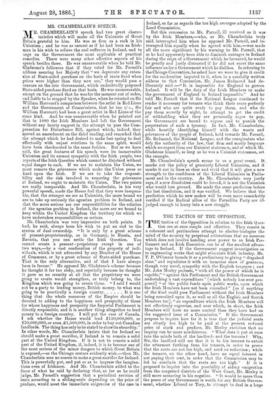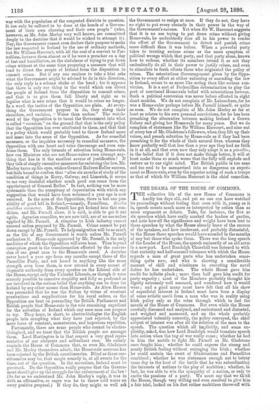THE TACTICS OF THE OPPOSITION.
THE tactics of the Opposition in relation to the Irish Ques- tion are at once simple and effective. They consist in a coherent and pertinacious attempt to electro-biologise the
mind of the country by perpetual reiterations that no measure which does not involve handing over power to an Irish Par-
liament and an Irish Executive, can be of the smallest advan- tage to Ireland. If the Government suggest investigation as to engineering works that might stimulate Irish industry, Mr. T. P. O'Connor brands it as a preliminary to giving " disguised alms," and repudiates it with an immense show of generous, though very novel, sympathy with the English taxpayer ; and Mr. John Morley protests, " with all the power of which he is capable," against this Parliament and the British Government undertaking a vast expenditure " [which nobody has ever pro- posed] " of the public funds upon public works, upon which the Irish Members have not been consulted" [as if anything of the kind could pass Parliament without the Irish Members being consulted upon it, as well as all the English and Scotch Members too], " an expenditure which the Irish Members will not effectively supervise, and over which, in short, the Irish Members will have no more control than they have had on the suggested issue of a Commission." If the Government propose to inquire how far it is true that the judicial rents are clearly too high to be paid at the present reduced price of stock and produce, Mr. Morley exclaims that no inquiry can be more mischievous. " What does it put at once into the minds both of the landlords and the tenants Why, Sir, the landlord will see that it is to his interest to extort the uttermost farthing from his tenants, in order to prove that the rents are not too high, and need no reduction ; while the tenants, on the other hand, have an equal interest in not paying their rent, in order that the Commission may be led to conclude that the rents are too high." If it is proposed to inquire into the possibility of aiding emigration from the congested districts of the West Coast, Mr. Morley is still more menacing in his negative. " It would be more than the peace of any Government is worth for any British Govern- ment, whether Liberal or Tory, to attempt to deal in a large way with the population of the congested districts in question. It can only be suffered to be done at the hands of a Govern- ment of their own choosing and their own people " (who, however, as Mr. John Morley very well knows, are committed deeply to the doctrine that it would be wicked to attempt it). Nay, the Government cannot even declare their purpose to make the law respected in Ireland by the use of ordinary methods, but Sir William Harcourt, with all the zeal of a convert to Par- nellism, lectures them almost as if he were a preacher on a day of fast and humiliation, on the sinfulness of trying to put down crime without at the same time preparing a measure that will tend to divert the people of Ireland from the disposition to commit crime. But if any one anxious to take a hint asks what the Government might be advised to do in this direction, the only reply is a solemn shake of the head ; for it appears that there is only one thing in the world which can divert the people of Ireland from the disposition to commit crime, and that is to give them full liberty and right so to legalise what is now crime that it would be crime no longer. In a word, the tactics of the Opposition are plain. At every- thing the Government propose to do, they shrug their shoulders, and exclaim, " Worse than useless." The watch- word of the Opposition is to taunt the Government into what is called " coercion," on the ground that that is the only policy that the Opposition has ever attributed to them, and that that is a policy which would probably tend to throw Ireland more and more into the arms of the Opposition. As for remedial measures, or the inquiries necessary to remedial measures, the Opposition with one heart and voice discourage and even con- demn them. The only formula of salvation being Home-rule, how can Ministers who are not Home-rulers even attempt any- thing that has in it the smallest savour of justification? If they talk of simply executive measures for enforcing the law, Mr. Morley turns up his eyes, wishes General Beavers Buller success, but feels bound to confess that "after six months of study of the condition of things in Kerry, Galway, and Limerick, it seems to me very doubtful whether much good can come from the appointment of General Buller." In fact, nothing can be more systematic than the conspiracy of depreciation with which any suggestion that would have been welcomed a year ago is now received. In the eyes of the Opposition, there is but one pos- sibility of good left in Ireland,—namely, Parnellism. Sinilia sintlibus curantur. Mr. Parnell has got Ireland into this con- dition, and Mr. Parnell alone; it is said, is able to get it out again. Agrarian remedies, we are now told, are of no use unless applied by Mr. Parnell. A stimulus to Irish industry cannot succeed unless proposed by Mr. Parnell. Crime cannot be put down except by Mr. Parnell. To help emigration will be as much as the life of any Government is worth unless Mr. Parnell authorises it. Home-rule approved by Mr. Parnell, is the only medicine of which the Opposition will even hear. Thus beyond conception great is the transformation effected by the conver- sion of one great man to the Home-rule creed. A doctrine never heard a year ago from any mouths except those of the Parnellite Party, and not heard in anything like the same strength even from them, is now uttered in every accent of dogmatic authority from every speaker on the Liberal side of the House, except only the Unionist Liberals, as though it were scarcely possible to conceive stupidity and folly so profound as are involved in the serious belief that anything can be done for Ireland by any other means than Home-rule. As Abon Hassan was persuaded that he was the Sultan by virtue of constant prestrations and supplications for his royal orders, so the Opposition are bent on persuading the British Parliament and British people that Home-rule is the sole remaining expedient for the salvation of Ireland which any sane man can propose to try. They hope, in short, to electro-biologise the English people into accepting what they have just rejected, by the mere force of constant, monotonous, and imperious repetition.
Fortunately, there are some people who cannot be electro- biologised, and we trust that the British people are amongst them. Lord Hartington is in that respect a very good repre- sentative of our obdurate and self-reliant race. He calmly reminds the House of Commons that, as even Mr. Gladstone and Mr. Morley themselves admit, the Home-rule nostrum has been rejected by the British constituencies. Blind as those con- stituencies may be, that magic remedy is, at all events for the time, out of the question. In the meantime, Ireland must be governed. Do the Opposition really propose that the Govern- ment should give up the struggle for the enforcement of the law ? (So far as we understand Mr. John Morley's reply, it was in drift an affirmative, so eager was he to throw cold water on every positive proposal.) If they do, they might as well ask the Government to resign at once. If they do not, they have no right to put every obstacle in their power in the way of the Government's success. Yet when Sir W. Harcourt suggests that it is no use trying to put down crime without giving Home-rule, he undoubtedly does all in his power to render the effort of the Government to detect and punish crime more difficult than it was before. When a powerful party takes to treating serious crime as the mere symptom of political wrongs which that party, and that party alone, knows how to redress, whether its members intend it or not they undoubtedly do all in their power to justify crime, and even to stimulate to fresh efforts those who originated the policy of crime. The ostentatious discouragement given by the Oppo- sition to every effort at either enforcing or amending the law in Ireland, seems to us more like acting than like serious con- viction. It is a sort of Pecksniffian determination to play the part of convinced Home-rule belief with ostentatious fervour. Such a political conversion was never before effected in eight short months. We do not complain of Mr. Labouchere, for he was a Home-ruler perhaps before Mr. Parnell himself, or quite as soon. We do not complain of Mr. John Morley so far at least as relates to his own personal convictions, for he has been preaching the alternative between making Ireland a Crown Colony and giving her Home-rule for many years. But we do complain of statesmen like Sir William Harcourt, and nine out of every ten of Mr. Gladstone's followers, when they lift up their voices, and preach salvation by Home-rule as if they had been preaching it for the whole of their natural lives, whereas they know perfectly well that less than a year ago they had no faith in it at all, and that even now they only adopt it as a pis-aller, in the belief that if it does not make things better, it will at least make them so much worse that the folly will explode and restore us to our right mind. The British public is too sane and too cool to be mesmerised into so dangerous an experi- ment as Home-rule, even by the superior acting of such a troupe as that of which Sir William Harcourt is the chief comedian.



































 Previous page
Previous page